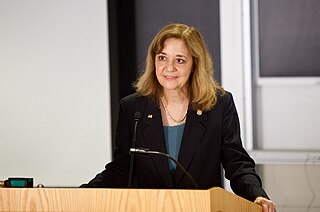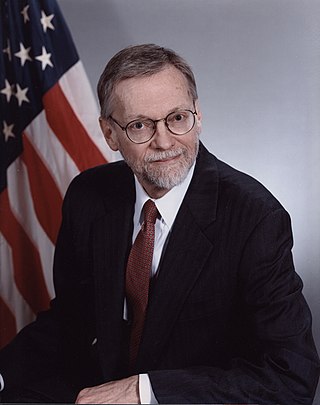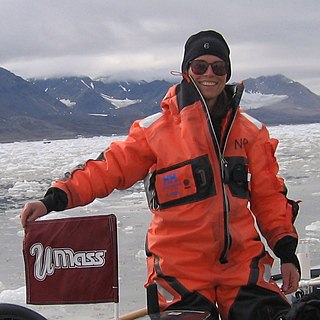Related Research Articles

William Aaron Nierenberg was an American physicist who worked on the Manhattan Project and was director of the Scripps Institution of Oceanography from 1965 through 1986. He was a co-founder of the George C. Marshall Institute in 1984.
Raymond S. Bradley is a climatologist and University Distinguished Professor in the Department of Geosciences at the University of Massachusetts Amherst, where he is also research director of the Climate System Research Center. Bradley's work indicates that the warming of Earth's climate system in the twentieth century is inexplicable via natural mechanisms.

The President's Council of Advisors on Science and Technology (PCAST) is a council, chartered in each administration with a broad mandate to advise the president of the United States on science and technology. The current PCAST was established by Executive Order 13226 on September 30, 2001, by George W. Bush, was re-chartered by Barack Obama's April 21, 2010, Executive Order 13539, by Donald Trump's October 22, 2019, Executive Order 13895, and by Joe Biden's February 1, 2021, Executive Order 14007.
David B. Rutledge is the Kiyo and Eiko Tomiyasu Professor (em.) of Engineering and former chair of the Division of Engineering and Applied Science at the California Institute of Technology (Caltech), United States. His earlier work on microwave circuits has been important for various advances in wireless communications and has been useful for applications such as radar, remote sensing, and satellite broadcasting. He also covers research in estimating fossil-fuel supplies, and the implications for alternative energy sources and climate change.
Robert W. Kates was an American geographer and independent scholar in Trenton, Maine, and University Professor (Emeritus) at Brown University.

James J. McCarthy was a Professor of Biological Oceanography at Harvard and was president of the American Association for the Advancement of Science from February 2008 to February 2009.

Rosina M. Bierbaum is currently the Roy F. Westin Chair in Natural Economics and Research Professor at the University of Maryland's School of Public Policy. She is also a professor and former dean at the University of Michigan School of Natural Resources and Environment (SNRE). She was hired in October 2001, by then-University of Michigan President, Lee Bollinger. She is also the current Chair of The Scientific and Technical Advisory Panel (STAP) that provides independent scientific and technical advice to the GEF on its policies, strategies, programs, and projects.

Donald James Baker is an American scientist who was trained as a physicist, practiced as an oceanographer, and has held science and management positions in academia, non-profit institutions, and government agencies. He a former Under Secretary of Commerce for Atmosphere and Oceans and Administrator of the U.S. National Oceanic and Atmospheric Administration (NOAA), and currently Director, Global Carbon Measurement Program, William J. Clinton Foundation working with forestry programs in developing countries with the aim of reducing carbon dioxide emissions and at the same time helping alleviate poverty.
Michael Calvin MacCracken, has been chief scientist for climate change programs with the Climate Institute in Washington, D.C., since 2002; he was also elected to its board of directors in 2006.

Tan Sri Zakri bin Abdul Hamid has had a distinguished career in science as a researcher, educator, administrator and diplomat.

Susan K. Avery is an American atmospheric physicist and President Emerita of the Woods Hole Oceanographic Institution (WHOI) in Massachusetts, where she led the marine science and engineering research organization from 2008–2015. She was the ninth president and director and the first woman to hold the leadership role at WHOI. She is Professor Emerita at the University of Colorado, Boulder (UCB), where she served on the faculty from 1982–2008. While at UCB she also served in various administrative positions, including director of the Cooperative Institute for Research in Environmental Sciences (CIRES), a 550-member collaborative institute between UCB and the National Oceanic and Atmospheric Administration (NOAA) (1994-2004); and interim positions (2004-2007) as vice chancellor for research and dean of the graduate school, and provost and executive vice chancellor for academic affairs. Currently she is a senior fellow at the Consortium for Ocean Leadership in Washington, D.C.

The contributions of women in climate change have received increasing attention in the early 21st century. Feedback from women and the issues faced by women have been described as "imperative" by the United Nations and "critical" by the Population Reference Bureau. A report by the World Health Organization concluded that incorporating gender-based analysis would "provide more effective climate change mitigation and adaptation."
Sreedharan Krishnakumari Satheesh is an Indian meteorologist and a professor at the Centre for Atmospheric and Oceanic Sciences of the Indian Institute of Science (IISc). He holds the chair of the Divecha Centre for Climate Change, a centre under the umbrella of the IISc for researches on climate variability, climate change and their impact on the environment. He is known for his studies on atmospheric aerosols and is an elected fellow of all the three major Indian science academies viz. Indian Academy of Sciences Indian National Science Academy and the National Academy of Sciences, India as well as The World Academy of Sciences. The Council of Scientific and Industrial Research, the apex agency of the Government of India for scientific research, awarded him the Shanti Swarup Bhatnagar Prize for Science and Technology, one of the highest Indian science awards for his contributions to Earth, Atmosphere, Ocean and Planetary Sciences in 2009. He received the TWAS Prize of The World Academy of Sciences in 2011. In 2018, he received the Infosys Prize, one of the highest monetary awards in India that recognize excellence in science and research, for his work in the field of climate change.
Frank Silvio Marzano was a professor at the Sapienza University of Rome, Italy who was named Fellow of the Institute of Electrical and Electronics Engineers (IEEE) in 2016 for contributions to microwave remote sensing in meteorology and volcanology. He was also a Fellow of the UK Royal Meteorological Society since 2012. In 2020 Dr. Marzano was inserted in the World's Top 2% Scientists database of Stanford University (USA).

James Zachos is an American paleoclimatologist, oceanographer, and marine scientist. He is currently a professor and chair of the Department of Earth and Planetary sciences at University of California, Santa Cruz where he was elected to the National Academy of Sciences in 2017. His research includes biological, chemical, and climatic evolution of late Cretaceous and Cenozoic oceans, and how past climatic conditions help predict the consequences of anthropogenic carbon emissions on future climate change.

Julie Brigham-Grette is a glacial geologist and a professor in the Department of Geosciences at the University of Massachusetts Amherst where she co-directs the Joseph Hartshorn Quaternary Laboratory. Her research expertise is in glacial geology and paleoclimatology; she has made important contributions to Arctic marine and terrestrial paleoclimate records of late Cenozoic to recent, the evolution of the Arctic climate, especially in the Beringia/Bering Strait region, and was a leader of the international Lake El’gygytgyn Drilling Project in northeastern Russia.

Joellen Louise Russell is an American oceanographer and climate scientist.

Kyle Powys Whyte is an Indigenous philosopher and climate/environmental justice scholar. He is a Professor of Environment and Sustainability and George Willis Pack Professor at the University of Michigan's School for Environment and Sustainability. Whyte formally served as the Timnick Chair in the Humanities in the Department of Philosophy at Michigan State University's College of Arts & Letters.
Jacqueline M. Grebmeier is an American ecologist who specializes in polar biological oceanography.
References
- ↑ "IEEE Transactions on Geoscience Electronics, November 1968". IEEE Transactions on Geoscience Electronics. 6 (4): 253–256. November 1968. doi: 10.1109/TGE.1968.271253 . Archived from the original on June 8, 2011 – via IEEE Xplore.